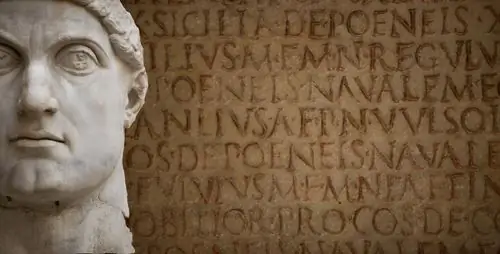Often in the process of communication on Internet forums, in social networks, or in private correspondence, or even just like that, people have a desire to find an ancient form of their name or give it one. And I want it to be not far-fetched, but truly, qualified, scientific. Of the ancient languages, Latin, of course, immediately comes to mind. What name in Latin can you take as an analogue of your name? And if this latter is Latin in origin, how to recreate its original form? The article attempts to understand these issues.

It is necessary
- Latin-Russian dictionary
- Russian-Latin Dictionary (https://linguaeterna.com/ru/lex.php)
- Dictionaries of names of different peoples (materials from the site "The Kurufin's Castle" (https://kurufin.narod.ru/index.html))
- Ability to work with a dictionary, the most elementary skills of translation from one language to another
Instructions
Step 1
Latin, as you know, in previous centuries was the language of common European culture. She greatly influenced the Russian language and national consciousness. Here lies the reason that a significant part of the current Russian names are, by their origins, just Latin names.
Moreover, many personal names in Russian have even retained their original Latin form unchanged. Take, for example, the names "Victor" or "Marina". The Latin version, various versions in other languages and the translation of such names can be easily found on specialized Internet sites, for example, on the site "The Kurufin's Castle"
Many Russian names have Greek (Andrey), Jewish (Ivan, Maria) and Old Slavic (Vladimir) origins. A considerable number of them have a Latin spelling that has already been established for centuries: Andreas, Joannes, Maria, Vladimirus.
Of course, there is a certain number of names, which, apparently, have never been translated into Latin. But it is precisely here that the creative task is laid for those who bear these names and want to, so to speak, romanize them. There are several ways to accomplish this transformation.
1. In the manner of the ancient Romans, the creators of classical Latin, and after them the medieval scientists, you can simply add the endings "-us" / "- yus" / "- is" to the male names (the endings of female names in Russian coincide with Latin): Glebus, Yurius, etc. But this is a too straightforward way, which does not always give the name a pleasant and effective sound (however, this is a matter of taste).
2. Another way: the word or words of which your name consists or on the basis of which your name is formed, if it is not ancient Roman, translated into Latin. For example, the name “Svetlana” is derived from the adjective “bright, clear”. It turns out - Lucia or Clara, i.e. Lucius or Clara are Roman names derived from Latin words with the same meaning.
3. Or take a more difficult case - the same name "Vladimir" (translated from Slavic - "owning / ruling the world"). Although it has a medieval version in Latin (see above), it can be precisely translated into Latin by meaning (enough dictionaries from the Internet), and then you get the two-syllable name Ermundus (from erus and mundus) or the double Regmundus (from rex and mundus). Very sonorous and impressive, isn't it?
4. You can also, following the custom of Ancient Rome, choose for yourself a "pseudonym" or a nickname for your patronymic / last name / real nickname, using the above methods.
Thus, it turns out that sometimes you do not need to invent anything, but simply find the desired Latin analogue of the Russian name or translate your name. However, this can become a full-fledged creative activity. There are probably other ways to romanize your first name, last name, etc. But this, due to the limited space, remains for the reader as, so to speak, homework.






